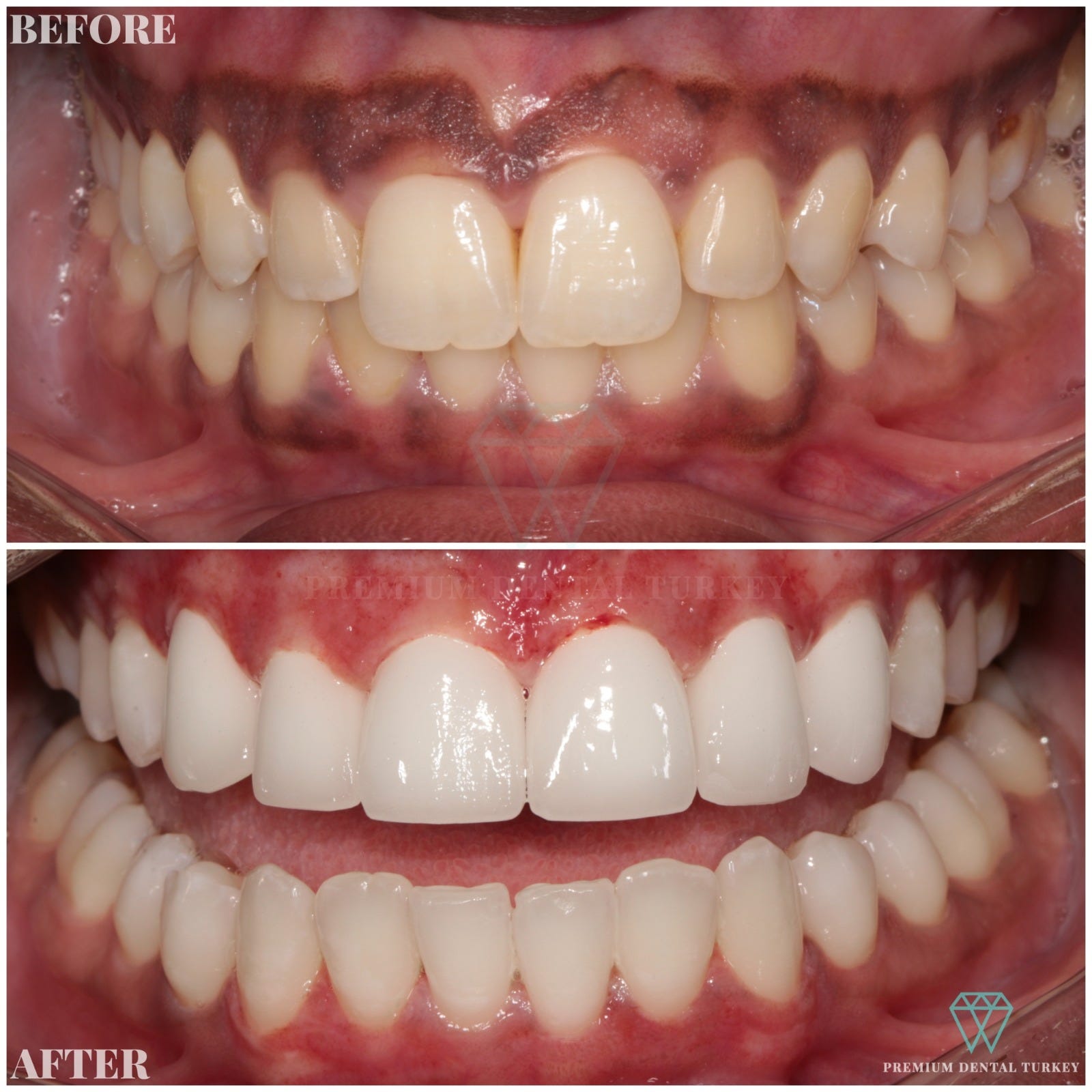
- Social media testimonies, viewed millions of times, have propelled the popularity of veneers.
- Turkey has become a mecca for plastic surgery tourism for TikTok and YouTube influencers in the UK
- Dentists warn the procedure could lead to costly fixes later in life.
- See more stories on Insider's business page.
Brooke Odun didn't intend to get her teeth done so quickly.
The cell phone sales representative and YouTube influencer, then 23, had always felt that while she didn't have the worst teeth in the world, they weren't perfect – and she wanted them to look better. But getting them fixed would cost lots of money. "I said to myself: 'When I have a bit more money, eventually I'll do it over the next few years,'" she explains.
What Odun didn't account for was her best friend's perseverance – and just how cheaply you can buy cosmetic dental surgery if you don't mind travelling outside of her home in the U.K. to have it done.
Odun's friend was more insecure than the influencer about her teeth, and wanted to get a veneer, a porcelain plate of ideal teeth, which sits on top of your old teeth after they are filed down into stubs. She decided she would do it for her birthday in 2018. When she approached a UK-based dentist, she was quoted more than £20,000 ($27,750). Then, she heard about a second option: if she traveled to Turkey, she could have it done there for £1,500. She told Odun and the two decided to get it done together. "When I saw the price I thought: 'What's the point in me waiting? I might as well go with her and do it at the same time'." Within two weeks Odun and her friend were on a plane to a clinic in Ankara, Turkey. Like any self-respecting influencer, she vlogged the whole experience in a two-part video that ended up being seen 1.6 million times.
A week later, they'd both return from their sojourn with heavier hand luggage and whiter, brighter smiles.
For a while, at least.
UK dentists are trained to carry out minimally invasive treatment, even paring back on the number of fillings they give in order to ensure the longevity of teeth. But Gurs Sehmi, a UK-based dentist, worries that in Turkey and other countries popular with health tourists, the production line approach means they worry less about the long-term impacts and more about short-term looks.
"The easy way to do veneers is to grind all the teeth down to little stubs," says Sehmi. "That way you're going to get fewer cosmetic complications, and things not fitting. It's kind of like a production line in those places, but the biological cost is irreversible, and that's the problem here."

Before travelling to Turkey, Odun sent pictures of her teeth to a Turkish dentist by email, who provided her with a quote. She then booked her flights into the country, and was picked up from the airport. "They give you the VIP treatment," she says. The morning after she arrived in Turkey, she had her first appointment. "We started the process there and then," she says. The dentist took x-rays and began filing her teeth down to small shark stubs. Odun and her friend were given temporary dentures to last a few days while their custom-made ones were produced.
When she first saw herself in the mirror without the temporary dentures, Odun was taken aback. "It was horrifying to see myself in a mirror with pegs and hillbilly teeth," she says. "I thought: 'Oh my God, there's no going back. This smile better look A-1'." But by then there was little she could do, and with hindsight, she doesn't regret it at all.
After the success of her initial vlogs, she's provided six-month, one-year and two-year updates on YouTube.
Odun's videos are just some of many on YouTube: there are around 20,000 videos if you search for "Turkey teeth" or "Turkey veneers", while videos posted to TikTok with the hashtag #turkeyteeth have been seen 11 million times.
A multi-billion dollar industry
Turkey has become a mecca for plastic surgery tourism for bargain-loving Brits - and its popularity has been propelled by social media testimonies posted by influential YouTubers and TikTokers like Odun. More than 2,000 cosmetic procedures are conducted in Turkey every day according to the International Society of Aesthetic Plastic Surgery (ISAPS), an industry body. An estimated 1,450 plastic surgeons ply their trade in the country, and one in five patients going under the knife are medical tourists flying into the country.
It's big business: one estimate says Turkey's medical tourists brought in $1.6 billion in revenue to the country in 2019, while Turkey's ministry of health plans to have 1.5 million people visiting the country for a nip and tuck of some sort by 2023, from whom they hope to earn $10 billion. Things have of course slowed over the past year due to Covid restrictions, but there's optimism that business will pick up again in 2021.
London-based Longevita UK, which facilitates medical tourism from the UK to Turkey for hair transplants, cosmetic surgery and dentistry work, is one of the UK's fastest-growing companies as measured by revenue growth. "We refer private patients to Turkish surgeons and dentists, who are qualified not only locally in Turkey but are also members of international associations in their specialism," says Kağan Seymenoğlu, founder and CEO of Longevita.
Business has boomed because of cost, says Seymenoğlu. "These surgeries are mostly available in private healthcare in the UK and are expensive, and not usually covered by private healthcare policies," he says.
In the UK, cosmetic remedial work to improve the look of teeth can cost between £1,000 ($1,400) and £2,500 ($3,500).
"That's out of the reach of younger people," says Sehmi, the UK-based dentist who worries about the impact of medical tourism. "So they think I can get the same thing done abroad, but they don't know it's not exactly the same thing. They don't know the non-financial costs."
In Turkey, the cost might be one-fifth of that. Lower rents, business taxes and overheads help drive down the price in Turkey, as well as lower wages across the board and cheaper liability insurance for plastic surgeons. That, combined with budget air travel, has made it competitive.

The fact that some patients are vlogging their experiences has helped perpetuate the procedure's popularity among young people, says Seymenoğlu. "People have this fear-of-missing-out element in their minds," he says. "They want to look better and they want to share their pictures or videos on social media. It's almost like there's a competition among people in terms of appearance. That creates a pressure among society, and especially for medium to low-income demographics, they want to have these treatments but can't afford it in the UK."
University of Alabama social media professor Dr Jess Maddox reckons it's more than just trying to attain the perfect smile because we're all filtered to within an inch of our lives on social media: travelling to Turkey to get your teeth fixed has become a social media experience.
Maddox says the link between social media aesthetics and what people are willing to do to their bodies is undeniable. "I'm always hesitant to say social media directly causes all these things - it's much more complicated than that," she says. "But there is definitely a relationship between online practice and what people want to do and how they'll act in the offline to improve their online presence."
Yet the offline damage done to improve one's online presence can make for a painful trade-off.
Dentists talk about the "restorative cycle" with teeth: small fillings inserted in childhood will later turn into bigger fillings, then crowns, then root canals. Surgeries tend to be small and done incrementally to spread out work over a long period of time. "If you electively go in and have everything ground down to stubs, you're pushing yourself really far down the cycle," Sehmi says. "The next stage is root canal treatments, and then you're looking at implants because the tooth itself can't be saved. This is a problem that happens five or 10 years down the line."
Breakage long before then, while rare, is also a concern. Sehmi says he's had cases where he has had to patch up the work of Turkish dentists. "I'll have patients who have been abroad and within months these crowns and veneers start falling off, just because they've not been glued in properly," he says.
Odun knows the teeth she had fitted at the age of 23 won't last her until she's 83. "The general warranty is like 10 or 20 years and then you'll need a touch-up," she says. "But for me that's still worth it. If I'm having to pay another grand or two in two decades, what is that? It's not an issue for me. I'll quite happily go back and do a touch-up again."